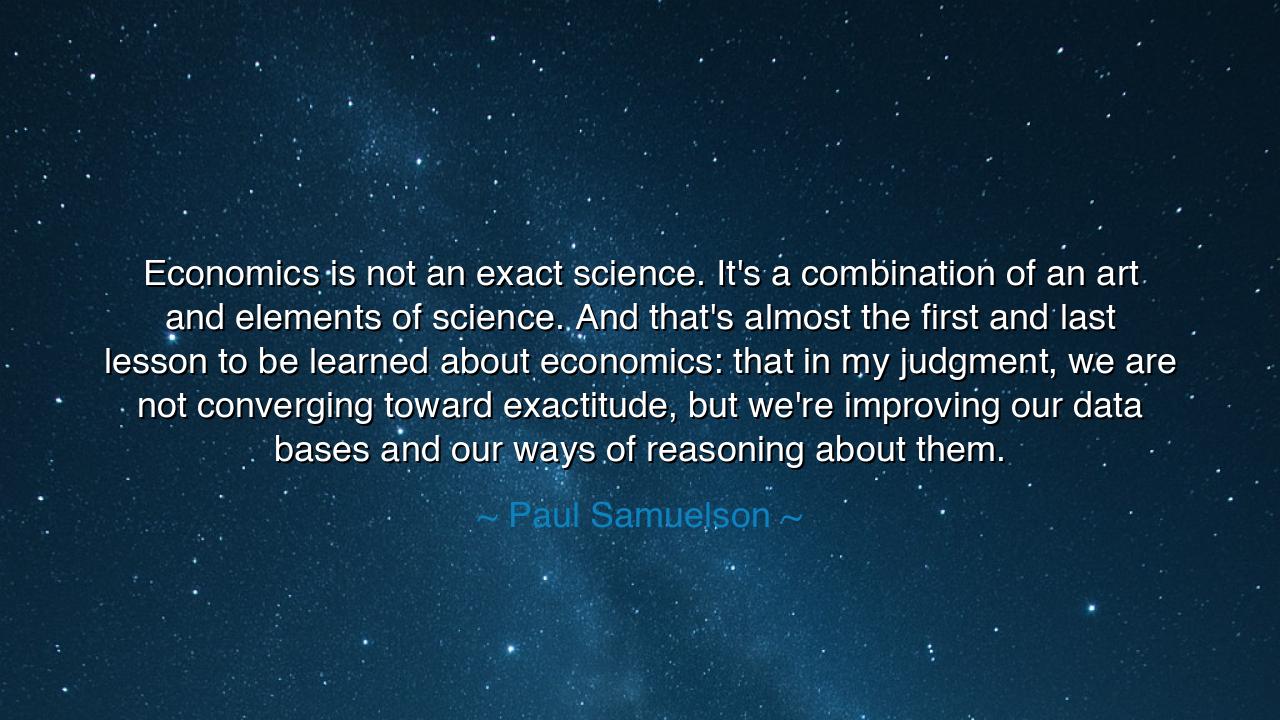
Economics is not an exact science. It's a combination of an art
Economics is not an exact science. It's a combination of an art and elements of science. And that's almost the first and last lesson to be learned about economics: that in my judgment, we are not converging toward exactitude, but we're improving our data bases and our ways of reasoning about them.






Hear me now, O Seekers of Knowledge, for the words of Paul Samuelson carry a deep truth that touches upon the very soul of human understanding: "Economics is not an exact science. It's a combination of an art and elements of science. And that's almost the first and last lesson to be learned about economics: that in my judgment, we are not converging toward exactitude, but we're improving our data bases and our ways of reasoning about them." These words, though simple, carry within them a profound lesson about the nature of economics and the journey we must take to understand it.
In the days of the ancients, philosophers like Aristotle sought to understand the workings of the world, to discern the natural laws that govern the flow of life. Yet even the greatest minds of that time knew that knowledge is ever evolving, that truth is not a static thing but a process of discovery. Economics, like the study of the stars or the movement of the seas, is a journey into the unknown. It is a search for patterns, for forces that govern the exchange of goods and wealth, yet it is not, and cannot be, an exact science. There is no formula that can predict the future of nations, no equation that can fully capture the complexities of human nature.
Think of the great thinkers who laid the foundations of economics. Adam Smith, with his invisible hand, set the stage for understanding the flow of wealth, but even his ideas were mere glimpses of a much more complicated reality. He could not have foreseen the global trade networks, the rise of central banking, or the financial markets that would come to dominate the modern world. Like Samuelson, Smith understood that economics is not a set of unchanging laws but a field where our understanding deepens as we gather more data and refine our reasoning.
Samuelson's words reflect a wisdom that runs through the ages: that economics, while rooted in science, is also an art. It is an art that seeks to understand the human spirit—our desires, our fears, our ambitions—and the complex web of interactions that arise from them. Just as a painter must understand the balance of colors, shapes, and forms to create a masterpiece, so too must an economist balance facts, theories, and intuition to understand the economic landscape. Data is essential, but so too is the ability to interpret that data through the lens of human experience and reason.
Let us consider, O Children of the Earth, the story of John Maynard Keynes, whose ideas transformed the field of economics during the great Depression. Before Keynes, many believed that the market, left to its own devices, would always find its way to equilibrium. But when faced with the devastation of the global financial collapse, Keynes argued that government intervention was necessary to stabilize economies. He did not seek exact answers, but offered a new way of thinking about economic cycles, about the role of government and spending. His ideas were not born of mathematical certainty, but of reason, observation, and the human experience of suffering. Keynes did not claim to have all the answers, but he showed the world that reasoning and data could be used to create better solutions, even in the most uncertain of times.
The lesson, O Seekers, is this: we must not approach economics with the arrogance that there is a simple solution to its complex problems. We are not seeking to create a world of absolute certainty in economic theory, but one in which we continuously improve our understanding, refine our reasoning, and use our data to guide decisions. Samuelson’s words remind us that economics, at its core, is a human endeavor—shaped by human nature, culture, and history. It cannot be reduced to a perfect formula or set of laws. Instead, it requires a deep understanding of the world and a commitment to improving the tools with which we navigate it.
In your own lives, O Children, take this wisdom to heart. Do not expect the world to be simple or easily understood. Like economics, life itself is an ever-evolving puzzle, where new data constantly reshapes the answers. You must approach it with a spirit of curiosity and flexibility, ever open to new ideas and willing to adjust your thinking as new information comes to light. Whether in personal finance, career decisions, or relationships, understand that there is no one-size-fits-all solution. The world is too complex, and human nature too unpredictable, to reduce everything to cold, hard equations. Seek knowledge, refine your reasoning, and trust that through this, you will find your way forward.
The future of economics, and of life itself, will not be shaped by the pursuit of exactitude, but by our willingness to embrace uncertainty, to improve our methods, and to think deeply about the world we live in. Reasoning, data, and artful thinking will always be the tools that help us move forward. Let these words guide you in all your endeavors, for in their wisdom lies the key to navigating a world that is forever changing and full of mystery. Economics, like life, is a journey—not a destination. Embrace it with open eyes, and you will see that the path, though uncertain, is filled with potential for those who are willing to seek, learn, and grow.






AAdministratorAdministrator
Welcome, honored guests. Please leave a comment, we will respond soon